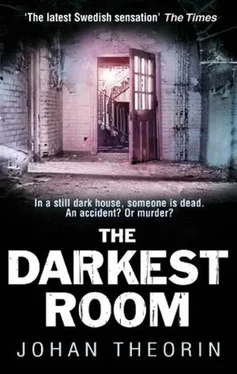“The light from the lighthouse doesn’t disturb you?” he asked.
“The light?” said Joakim.
“The constant flashing at night, from the lighthouse tower out on Eel Point?”
Joakim shook his head.
“I suppose you get used to it,” said Högström. “It’s probably similar to having traffic noise just outside your window. You lived in the middle of Stockholm before you came here, didn’t you?”
“A little way out,” said Joakim.
It was only small talk, an attempt to lighten the heavy conversation, but for Joakim it was still a huge effort to find the words.
“So it’s hymn number 289 to begin with, hymn 256 after the prayers, and hymn 297 to finish off,” said Högström. “That was what we said, wasn’t it?”
“That’ll be fine.”
A dozen or so guests from Stockholm arrived the evening before the funeral: Joakim’s mother, his uncle, two cousins, and some close friends of his and Katrine’s. They
moved cautiously around the house and talked mostly to one another. Livia and Gabriel were excited by all the visitors, but didn’t ask why everyone had come.
The funeral took place at eleven o’clock on a Thursday in the Marnäs church. The children weren’t there-Joakim had dropped them off as usual at eight o’clock, without saying anything. For them today was like any other, but Joakim had driven home, put on his black suit, and lay down on the double bed again.
The wall clock was ticking out in the corridor, and Joakim remembered that it was his wife who had wound it up. It shouldn’t be ticking now she was gone, but it was.
He had stared at the bedroom ceiling thinking about all that was left of Katrine in and around the house. Inside his head he could hear her calling to him.
An hour later Joakim was sitting on an uncomfortable wooden pew, his eyes fixed on a large mural. It showed a man of his own age nailed to a Roman instrument of torture. A cross.
The church in Marnäs was high and filled with echoes. The sound of quiet weeping hovered beneath the vaulted stone ceiling.
Joakim was sitting right at the front next to his mother, who was wearing a black veil and weeping with small, careful sniffles, her head bowed. He himself knew he wasn’t going to cry at all, just as he hadn’t shed a single tear at Ethel’s funeral last year. The tears always came later, late at night.
It was two minutes to eleven when the church door opened and a tall, broad-shouldered woman strode in. She was wearing a black coat and a black veil that concealed her eyes, but her lips were painted with bright red lipstick. Her heels echoed on the stone floor, and many heads turned in the church. The woman marched up and sat down in the pew
at the front on the right, next to Katrine’s four half sisters and brothers.
She was their mother and Katrine’s mother: Mirja Rambe, Joakim’s mother-in-law, the artist and singer. He hadn’t seen Mirja since their wedding seven years earlier. In contrast to that particular day, she appeared to be sober now. Just as Mirja sat down, the bells began to toll up in the church tower.
Less than forty-five minutes later it was all over, and Joakim could hardly remember anything about what Pastor Högström had said, or what hymns they had sung in the church. His head had been filled with images and sounds of crashing waves and running water.
Afterward, when they had crossed the bitterly cold churchyard and gathered in the community hall, lots of people came over to talk to him.
“I’m so sorry, Joakim,” said a bearded man, patting him on the shoulder. “We were very fond of her.”
Joakim focused his gaze and suddenly recognized the man-it was his uncle from Stockholm.
“Thank you… thank you very much.”
There wasn’t much else to say.
Several other people wanted to stroke his back or give him a stiff embrace. He let them carry on; he was everybody’s pet.
“It’s so awful… I was only talking to her a few days ago,” said a weeping girl aged about twenty-five.
He recognized her behind the handkerchief she was using to wipe her eyes; it was Katrine’s younger sister. Her name was Solros-Sunrose, he recalled. Mirja had given all five of her children unusual second names; Katrine’s was Månstråle, Moonbeam, but she’d hated it.
“And she’d been so much happier lately,” Solros went on.
“I know… she was glad we’d moved down here.”
“Yes, and she was pleased she’d found out about her father as well.”
Joakim looked at her.
“Her father?” he said. “Katrine never had any contact with her father.”
“I know,” said Solros. “But Mom’s written a book and revealed who he was.”
The tears came again; she hugged him and went off to join her brothers and sisters.
Joakim stayed where he was and saw Albin and Viktoria Malm, friends from the center of Stockholm, sitting at a table with the Hesslin family, their neighbors from Bromma.
He also saw his mother, sitting alone at another table with a cup of coffee, but didn’t go over to her.
When he turned around, Pastor Högström was talking to a small gray-haired woman on the other side of the room. He went to join them.
Högström turned his kindly gaze in his direction. “Joakim,” he said. “How are you feeling?”
Joakim just nodded, several times. It was an appropriate response, it could mean anything. The little elderly lady smiled up at him expectantly and nodded as well, but didn’t seem to know what to say either. Then she took two tentative steps backward and disappeared.
That’s the thing about the bereaved, thought Joakim, they smell of death and are best avoided.
“I’ve been thinking something over,” he said seriously to Högström.
“Oh yes?”
“If you hear someone calling for help here on the island, when you yourself are on the mainland, miles and miles away, what does that mean?”
The priest looked at him blankly. “Miles and miles away… how could you possibly hear that?”
Joakim shook his head. “But that’s what happened,” he said. “I heard my wife… Katrine, when she died. I was in
Stockholm at the time, but I heard her when she drowned. She called out to me.”
The priest looked down into his coffee cup. “Perhaps you heard someone else?” He had lowered his voice, as if they were talking about forbidden matters.
“No,” said Joakim. “It was Katrine’s voice.”
“I understand.”
“I know I heard her,” said Joakim. “So what does it mean?”
“Who knows, who knows,” was all Högström said, patting him gently on the shoulder. “Get some rest now, Joakim. We can talk again in a few days.”
Then he left.
Joakim stood there staring at a poster on the wall advertising a charity collection for those affected by radiation in Chernobyl. Ten years had passed since the catastrophe.
OUR DAILY BREAD FOR THE VICTIMS OF THE RADIATION, said the heading on the poster.
Our daily Chernobyl, thought Joakim.
Finally it was evening again and he was back at Eel Point. This long day was coming to an end.
Inside the house Livia and Gabriel were being put to bed by their grandmother. Lisa and Michael Hesslin were standing by their car out at the front. It was late and they had a long journey back to Stockholm, but they had still come back to the house with him.
“Thanks for coming,” said Joakim.
“No problem,” said Michael, placing his black suit in its plastic covering on the back seat.
There was a tense silence.
“Come up to Stockholm soon,” said Lisa. “Or come over to Gotland with the children, to our cottage.”
“Maybe.”
“We’ll be in touch, Joakim,” said Michael.
Joakim nodded. Gotland sounded better than Stockholm. He never wanted to go there again.
Читать дальше










